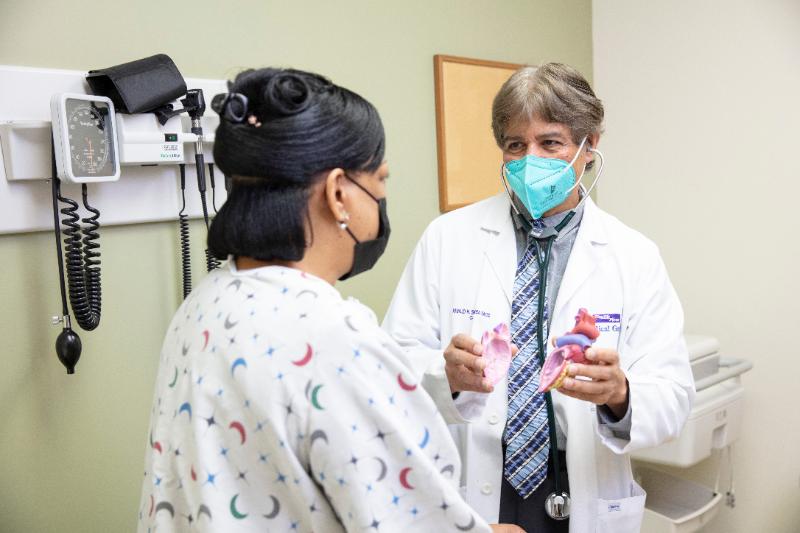Brevard's Community Healthcare System introduces a new resource for identifying patients heading down a cardiac disease path — and preventing or even reversing grave conditions before they arise.

In 2020, the biggest illness or disease inside American hospitals wasn't cancer or even COVID-19. It was cardiac arrest.
Across the nation, heart disease-related deaths topped others by tens of thousands, according to the Centers for Disease Control and Prevention.
But it doesn't have to be so, says Dr. Khalid Sheikh.
Sheikh has been the lead cardiologist in developing a new Health First Heart and Vascular service called Preventive Heart Care that will begin treating patients this February, which is designated by the American Heart Association as American Heart Month.
He's also celebrating 30 years of practicing cardiology in Brevard County. For the first half of that, he trained his considerable focus on critical cardiac care, performing heart catheterizations, coronary angioplasties, and stents in the Cardiac Cath Lab. Nationally, 1.5 million Americans suffer cardiac arrest, but even more undergo angioplasty, which is the surgical repair or unblocking of a heart blood vessel.
"In nearly every case, heart disease can be prevented in those who don't yet have it," Sheikh says. "But we do know it can be reversed in those who do have it."
For many years, the practice of cardiology was "reactive," Sheikh says. Following a heart attack, a patient might undergo angioplasty or bypass surgery, be prescribed a statin drug, be encouraged to begin a new diet or all of these in combination. Of course, little more than half of the 1.5 million Americans who suffer a heart attack each year live to be treated.
Sheikh says this must change.
"Treatment of heart disease has become so sophisticated," he notes. "This service will provide a level of expertise in the community to bring that sophistication to our customers."
One such recent shift has been developing personalized treatment profiles based on heart imaging. Mammography transformed the treatment of breast cancer and altered the fates of millions of women; today, high-quality heart diagnostic testing, often including advanced heart imaging techniques, can in many cases identify patients at risk for heart disease before they experience symptoms.
These heart pictures are weighed alongside personal data points — other heart disease markers, lifestyle and medical conditions — and genetics. A patient's DNA cannot be modified, but their phenotypes, the way their genotypes express themselves, can influence courses of treatment. Imagine a less interventional and pharmacological course based on all of this data — that's also more effective.
"We're excited about the ability to not only begin this initiative of primary prevention — that is, to identify patients before they have symptoms — but establish treatment plans that will arrest or reverse their heart disease before they have their heart attack or stroke," Sheikh says. "That is one of the primary initiatives of this service."
Nearly 100 million American adults have cholesterol levels that may put them at risk for heart disease. But with the proper knowledge and sophisticated diagnostics, catastrophic events can be prevented.
Know This — First Steps Toward Smart Heart Health
Dr. Sheikh says these are the very first things he would tell anyone curious about taking the first steps toward a healthier heart:
- Do you get a regular medical follow-up? "Establishing" with a primary care provider is the first step toward better self-care. "This is blocking and tackling in football. You practice that before you toss a flea-flicker." A standing appointment with a provider will track things like cholesterol and blood pressure over time.
- Do you smoke or need to lose weight? In cardiac care, tobacco use and obesity are called "modifiable risk factors." They can be reversed with treatment and attention.
- Are you interested in a personalized plan? Broad metrics such as age and sex are the broadest risk factors in the fight to prevent heart disease. "Don't use your neighbor as an anecdote for what could be happening to you — seek a one-one-one evaluation with a medical practitioner."
Preventive Heart Care soon will feature an online assessment to help people determine their heart risk and point them to the steps they may take to get more information and a medical evaluation.
"Getting people who have some concerns, or even very little concern right now, thinking about their wellness, their family history, their diet, and physical activity, that's what holistic care at Health First is all about."
To learn more, visit HF.org/HeartHealth.